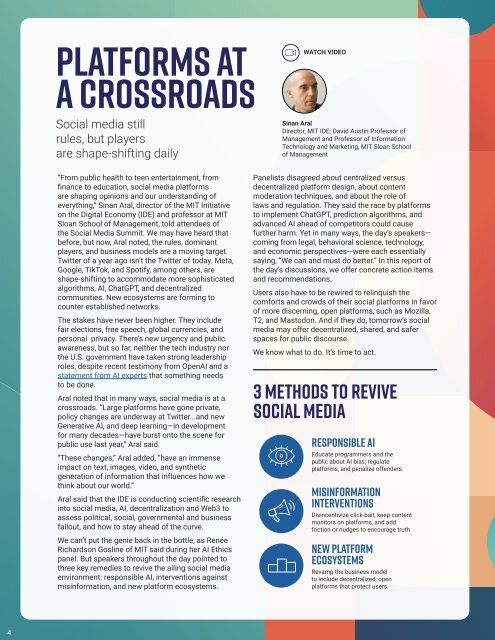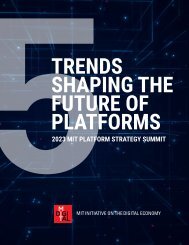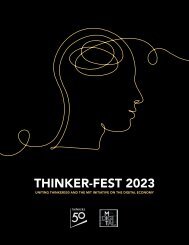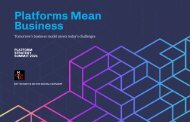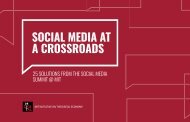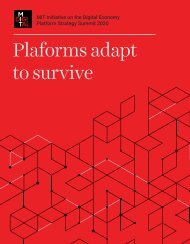The 2023 Social Media Summit@MIT Event Report
You also want an ePaper? Increase the reach of your titles
YUMPU automatically turns print PDFs into web optimized ePapers that Google loves.
Platforms at<br />
a Crossroads<br />
<strong>Social</strong> media still<br />
rules, but players<br />
are shape-shifting daily<br />
WATCH VIDEO<br />
Sinan Aral<br />
Director, MIT IDE; David Austin Professor of<br />
Management and Professor of Information<br />
Technology and Marketing, MIT Sloan School<br />
of Management<br />
“From public health to teen entertainment, from<br />
finance to education, social media platforms<br />
are shaping opinions and our understanding of<br />
everything,” Sinan Aral, director of the MIT Initiative<br />
on the Digital Economy (IDE) and professor at MIT<br />
Sloan School of Management, told attendees of<br />
the <strong>Social</strong> <strong>Media</strong> Summit. We may have heard that<br />
before, but now, Aral noted, the rules, dominant<br />
players, and business models are a moving target.<br />
Twitter of a year ago isn’t the Twitter of today. Meta,<br />
Google, TikTok, and Spotify, among others, are<br />
shape-shifting to accommodate more sophisticated<br />
algorithms, AI, ChatGPT, and decentralized<br />
communities. New ecosystems are forming to<br />
counter established networks.<br />
<strong>The</strong> stakes have never been higher. <strong>The</strong>y include<br />
fair elections, free speech, global currencies, and<br />
personal privacy. <strong>The</strong>re’s new urgency and public<br />
awareness, but so far, neither the tech industry nor<br />
the U.S. government have taken strong leadership<br />
roles, despite recent testimony from OpenAI and a<br />
statement from AI experts that something needs<br />
to be done.<br />
Aral noted that in many ways, social media is at a<br />
crossroads. “Large platforms have gone private,<br />
policy changes are underway at Twitter...and new<br />
Generative AI, and deep learning—in development<br />
for many decades—have burst onto the scene for<br />
public use last year,” Aral said.<br />
“<strong>The</strong>se changes,” Aral added, “have an immense<br />
impact on text, images, video, and synthetic<br />
generation of information that influences how we<br />
think about our world.”<br />
Aral said that the IDE is conducting scientific research<br />
into social media, AI, decentralization and Web3 to<br />
assess political, social, governmental and business<br />
fallout, and how to stay ahead of the curve.<br />
We can’t put the genie back in the bottle, as Renée<br />
Richardson Gosline of MIT said during her AI Ethics<br />
panel. But speakers throughout the day pointed to<br />
three key remedies to revive the ailing social media<br />
environment: responsible AI, interventions against<br />
misinformation, and new platform ecosystems.<br />
Panelists disagreed about centralized versus<br />
decentralized platform design, about content<br />
moderation techniques, and about the role of<br />
laws and regulation. <strong>The</strong>y said the race by platforms<br />
to implement ChatGPT, prediction algorithms, and<br />
advanced AI ahead of competitors could cause<br />
further harm. Yet in many ways, the day’s speakers—<br />
coming from legal, behavioral science, technology,<br />
and economic perspectives—were each essentially<br />
saying, “We can and must do better.” In this report of<br />
the day’s discussions, we offer concrete action items<br />
and recommendations.<br />
Users also have to be rewired to relinquish the<br />
comforts and crowds of their social platforms in favor<br />
of more discerning, open platforms, such as Mozilla,<br />
T2, and Mastodon. And if they do, tomorrow’s social<br />
media may offer decentralized, shared, and safer<br />
spaces for public discourse.<br />
We know what to do. It’s time to act.<br />
3 METHODS TO REVIVE<br />
SOCIAL MEDIA<br />
RESPONSIBLE AI<br />
Educate programmers and the<br />
public about AI bias; regulate<br />
platforms, and penalize offenders.<br />
MISINFORMATION<br />
INTERVENTIONS<br />
Disincentivize click-bait, keep content<br />
monitors on platforms, and add<br />
friction or nudges to encourage truth<br />
NEW PLATFORM<br />
ECOSYSTEMS<br />
Revamp the business model<br />
to include decentralized, open<br />
platforms that protect users.<br />
4<br />
5


